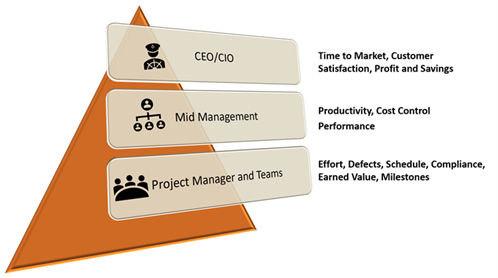
Quantitative software measurement extends significant benefits to IT organizations. Relatively few successful, robust, and mature measurement frameworks have been implemented. Function Pointscontinues to be the “de facto” standard for software measurementaround the world.
“When performance is measured, performance improves” (Galorath, D & Evans, M. 2006)
Control of your software development productivity is probably the most tangible benefit derived from the implementation ofFunction Points. Organizations that can measure their productivity (Hours/Function Point) can establish modelsto benchmark their productivity againstthe rest of the industry(which includes competitors and similar organizations)and their own historical performance. Based on this,they can truly startto develop a competitive advantage by identifying ways to develop software faster and cheaper, without impacting quality and overall end user satisfaction.
The impacts of software measurement extend multiple levels within an organization:
At this first level,development teams and project managers are primarily accountable for project delivery. This requiresthe proper tools and methods to track and control performanceas well as the ability to estimate software deliverables (work packages).The second level of the organization features middle managers. These are typically department or business division managers, PMO directors and portfolio/account managers responsible for multiple projects.Metrics that provide this insight include productivity, cost monitoring and control, performance and efficiency, and overall quality.Finally, CEO level managementneed information to make goodstrategic decisions based oninformation provided by software measurement.Function Points are the underpinning metric that makes all this possible.
At Galorath, we willhelp you to:-Familiarize with the counting practices as officially established by IFPUG (www.ifpug.org)-Learn by using real and relevant examples from your organization-Get on your way to the IFPUG CFPScertification-And most important, bring value to your organization in the form of controlled productivity
About the instructor:
Esteban Sanchez is a Galorath instructor, Certified Function Points Specialist who also serves at the IFPUG Functional Sizing Standards Committee(FSSC Board)
Mastering the Art of Reliable Estimation in Digital and IT Projects
The evolution of estimation practices, challenges and best practices, and the utilization of advanced cost estimation tools to transform the estimation of notional project design from a complex challenge into a strategic asset in project management….
The role of ESG in Modern Manufacturing
In the architectural marvel that is modern business, ESG (Environmental, Social, and Governance) stands as the foundational pillar, especially within the manufacturing sector. Just as a well-constructed building requires a solid foundation, every ESG component ensures a manufacturing enterprise’s stability, resilience, and longevity….
Moving From a Rough Order of Magnitude (ROM) Estimate to a Detailed Project Plan
WHAT IS A ROM AND WHY DO I NEED ONE? Project managers—whether they work for a software development company, a manufacturing company, or an engineering design firm—are faced with the common challenge of estimating…
Guide to Building Best-in-Class Costing Systems
The costing system in an enterprise serves a strategic function for the business. It plays a vital role as understanding costs leads to better decisions. Costing can serve proposal responses, acquisitions, vendor assessment, pricing,…
Unlocking the Future of Cost Estimation
Insights from the webinar “Embracing Opportunities of AI in Cost Estimation,” presented by Galorath and the Society of Cost Engineers Galorath and The Society of Cost Engineers presented an exclusive webinar aimed at…







